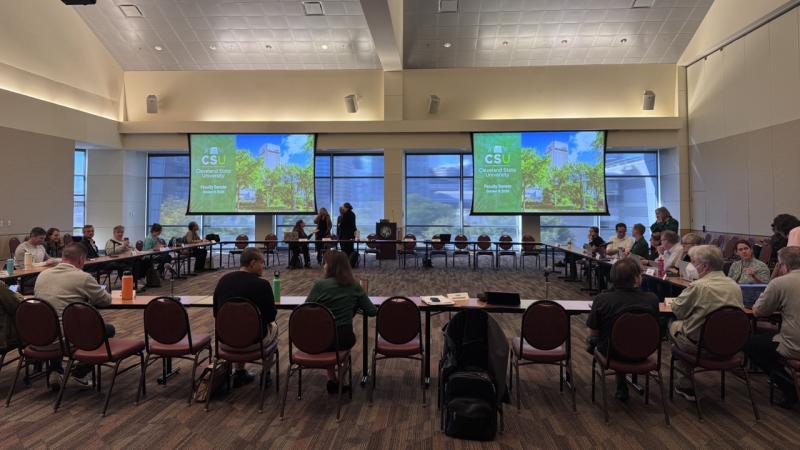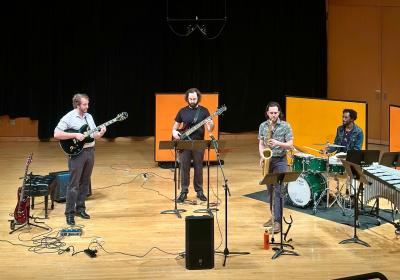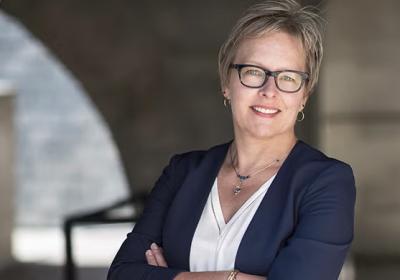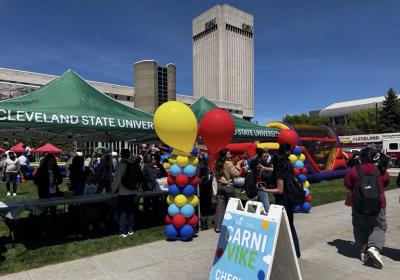
CSU faculty senate gets update on strategic plan, unified academic coaching
Cleveland State University's second faculty senate meeting for fall 2024, held Oct. 9, led with the president's report and included the provost's and committee reports. But most discussion focused on the university's shift to centralized academic advising, a model known as "unified academic coaching."
Unified academic coaching
Vice President for Student Belonging and Success Tachelle Banks, Ph.D., and Provost Nigamanth Sridhar, Ph.D., updated the senate on CSU’s transition to centralized academic advising, otherwise known as unified academic coaching, which began this semester.
A unified academic coaching model pairs students with a professional academic coach to support them throughout their time at CSU. The goal of the model is to create a uniform standard of care for students and allow structural flexibility for faculty.
“Our advising professionals worked incredibly hard. Many of them work overtime. They are focused on supporting students, and yet, when we look at outcomes, only one in two students that arrives here as a freshman graduates – only seven in 10 make it to a second year,” Sridhar said. “We need a systemic and structural change in the way that we deal with students, and that's what this is.”
Banks and Sridhar hope the unified model will create balance in the workloads of advising faculty.
Dr. Emily Rauschert and Dr. Aaron Severson from the College of Arts and Sciences and Dr. Judy Ausherman from the health college asked questions about the unified model, given the range and diversity of CSU's academic departments.
In response, Banks and Sridhar reiterated that the model has been utilized nationally, yielding successful results. They assured the faculty senate that the unified model will not erase faculty’s role from advising in programs where that is the norm and will allow assistant deans to stay involved in their colleges. They said that the change comes in assistant deans’ supervisory responsibilities becoming those of an academic adviser.
Banks and Sridhar emphasized that they want colleges and departments to retain their individuality while utilizing the unified model.
CSU president's report
Cleveland State President Laura Bloomberg, Ph.D., updated the faculty senate on her recent State of the University address, specifically the university’s new marketing campaign, “If Not for CSU,” in which alumni tell stories of how CSU helped them succeed professionally. Her update included a video showcasing some of the stories told for the campaign.
Bloomberg and faculty senate president, Dr. Carol Olszewski, also updated the senate on CSU’s strategic plan and task force.
Bloomberg and Olszewski explained that the task force has been incorporating feedback, locking in their mission, vision and values as they move towards setting priorities, metrics and objectives for the plan. They also presented the task force’s final SWOT (Strengths, Weaknesses, Opportunities and Threats) analysis of the plan.
The task force’s mission statement “Cleveland’s University. Infinite Opportunity” was finalized with a longer statement to supplement it:
“At CSU, we leverage our unique location and partnerships to equip learners with knowledge and future-ready skills. Through innovative research, dedicated service and exceptional talent, we address the evolving needs of our community.”
Olszewski explained that the task force was able to finalize this statement by directly using words submitted anonymously as feedback to task force proposals.
The task force drafted three priorities for CSU. Priority A is to advance academic offerings, delivery and scholarship to foster success. Priority B is to reimagine community partnerships to increase opportunities. Priority C is to restructure the operational and financial model to enable the university's mission-focused work.
The task force is currently taking feedback from the senate on their proposed priorities and will be building metrics from the priorities once they are finalized.
Committee reports
After Bloomberg’s report, various senate committee chairs took turns speaking.
Dr. Michele Heath, chair of the university curriculum committee, led the vote on two items. The first item was whether two urban studies courses, Proposal Writing and Social Justice and the City, should no longer fulfill the Writing Across the Curriculum (WAC) General Education requirement. The second item was adding a broadcasting minor to the School of Communication beginning in the spring 2025 semester. The senate voted in favor of both items.
Dr. Michael Wiitala, chair of the admissions and standards committee, led the vote on whether the GRE requirement should be dropped, which the senate approved.
Dr. Judy Ausherman, co-chair of the budget and finance committee, presented answers to questions that arose from the previous faculty senate meeting such as what the university’s actual budget deficit is. Ausherman reported that the structural deficit of CSU is $5 million.
Dr. Thijs Heus spoke for the ad-hoc committee on the course feedback survey. Heus informed the senate that the committee has drafted a new course feedback survey that focuses on qualitative responses to improve classes rather than quantitative responses to assess teaching. The new survey also takes less time to complete and is adaptable to nontraditional courses. A pilot survey will be run before full implementation of the survey.
Provost's report
Provost Sridhar announced a change, implemented in spring 2024, to how valedictorians will be honored at commencement. In spring 2024, all college valedictorians were on stage for commencement, in contrast to previous commencements when only the university valedictorians were on the stage. He added that CSU is also changing the process of choosing a student speaker at commencement, and that only one valedictorian will speak.
Sridhar also updated the senate on CSU’s report on enrollment, courses, programs and duplicated programs that is due in September 2025. He reminded faculty that they should be working on completing their workload, including teaching assignments, research responsibilities and service responsibilities, for the next academic year.
The next faculty senate meeting will be at 3 p.m. on Wednesday, Nov. 6, in the Student Center Glasscock Ballroom, during which the faculty will discuss as part of the agenda plans for increasing enrollment.










